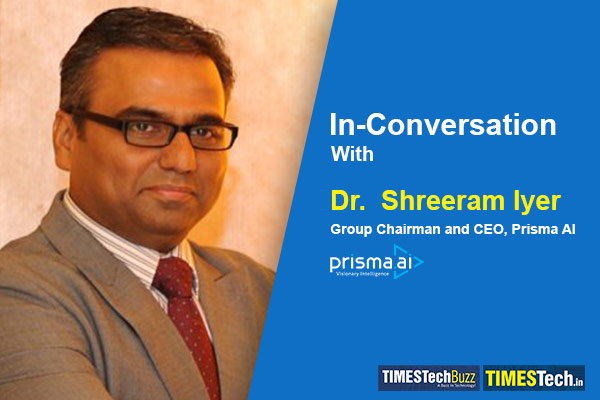Prisma AI’s collaboration with Jaipur Pink Panthers introduces Veri5, an AI-powered facial recognition system, transforming the Pro Kabaddi League’s spectator experience. Dr. Shreeram Iyer, Prisma AI’s CEO, discusses the implementation of Gryphos technology, enhancing fan engagement, streamlined venue access, and improved security. This pioneering partnership sets the stage for future technological advancements in sports arenas, marking a paradigm shift in the convergence of innovation and sports entertainment.
Read the full interview here:
TimesTech: How does the partnership between Prisma AI and Jaipur Pink Panthers, specifically the implementation of Veri5 for ticketing in the Pro Kabaddi League, aim to revolutionize the fan experience in stadiums?
Dr. Shreeram: Veri5 is the AI-empowered facial recognition-based verification platform powered by Prisma AI’s patented visual recognition platform Gryphos. Veri5’s innovative facial recognition technology brings spectators a seamless and secure entry process. Facial recognition allows fans to enter the stadium swiftly without the hassle of physical tickets or long queues, thereby amplifying convenience and efficiency. Moreover, Veri5 enhances security measures by accurately identifying attendees and minimizing the risk of unauthorized access. This integration streamlines the entry process and adds a layer of personalization to the fan experience. As their entry becomes tailor-made, attendees feel valued, bringing a sense of belonging and engagement.
Additionally, the partnership establishes a precedent for technological advancements within sports arenas, paving the way for future innovations to elevate spectator experiences in sporting events worldwide. This partnership between Prisma AI and Jaipur Pink Panthers represents a paradigm shift towards a more seamless, secure, and personalized fan journey within the Pro Kabaddi League venues and stadiums and venues for other sports as well, ushering in a new era in sports entertainment.
TimesTech: Could you explain how Prisma AI’s visual AI algorithms minimize large crowds and wait times at sporting events and what benefits this technology brings to fans and organizers?
Dr. Shreeram: Prisma AI’s visual AI algorithms leverage real-time video feeds to analyse crowd counts, density, and flow patterns, allowing organizers to identify congestion points and optimize crowd management strategies accordingly. By dynamically adjusting entry and exit points and concession stand operations, Prisma AI helps redistribute crowds more efficiently, minimizing wait times for fans.
The benefits of this technology extend to both fans and organizers alike. It translates to a more enjoyable and stress-free experience for fans, with shorter wait times for entry, concessions, and restroom facilities. They can navigate the venue more easily, find seating quicker, and spend less time in queues. For organizers, Prisma AI’s algorithms improve operational efficiency and enhance overall event safety. By optimizing crowd flow, organizers can mitigate safety risks associated with overcrowding and ensure compliance with venue capacity regulations. In addition to this, the technology provides various valuable insights, enabling organizers to fine-tune future event planning and enhance the overall fan experience.
TimesTech: Abhishek Bachchan mentioned that the collaboration with Prisma AI marks a groundbreaking phase in sports technology. How does Prisma AI contribute to improving the fan experience and engagement, and what role does technology play in advancing sports?
Dr. Shreeram: Prisma AI significantly improves fan engagement by leveraging cutting-edge technologies like artificial intelligence and facial recognition. By implementing advanced solutions like Veri5, Prisma AI streamlines entry processes, offering fans a seamless and personalized experience in sports arenas. This enhances convenience and builds a deeper connection between the fans and the sporting event.
Additionally, integrating technology in sports, as exemplified by Prisma AI’s solutions, is pivotal in advancing the overall sports landscape. From artificial intelligence experiences to data analytics that provide insights into player performance, technology enriches the viewing experience, making it more immersive and interactive. Beyond the spectator realm, technology contributes to athlete training, injury prevention, and performance analysis, thereby pushing the boundaries of what is achievable in the sporting arena. In essence, Prisma AI’s collaboration with Jaipur Pink Panthers signifies a broader trend wherein technology becomes a catalyst for elevating fan engagement and pushing the boundaries of possibility in the ever-evolving world of sports.
TimesTech: Dr. Shreeram Iyer highlighted using computer vision, particularly Gryphos, for an enhanced in-stadium fan experience, streamlined venue access, and improved security. Can you provide more details on how this technology is utilized for these purposes?
Dr. Shreeram: Gryphos is Prisma AI’s patented visual recognition platform and is the core of our innovative approach to creating an unparalleled in-stadium fan experience, ensuring streamlined venue access, and strengthening security measures.
Gryphos, powered by AI-based machine learning algorithms conceptualized and crafted by Prisma AI, is designed to understand human body language, signals, and behavior. Through advanced deep convolutional neural networks, Gryphos establishes a second language, enabling a profound comprehension of gestures and behavioral patterns.
In-stadium Fan Experience: Gryphos’s deep learning system analyses videos, images, objects, and faces in real-time. This allows us to interpret and predict fan behavior, creating a dynamic and engaging environment within the stadium. Whether capturing crowd reactions, enhancing interactive displays, or tailoring in-stadium services, Gryphos elevates the overall fan experience.
Streamlined Venue Access: Gryphos is instrumental in optimizing venue access with its precise visual recognition capabilities. By seamlessly matching visual interfaces such as images, videos, and objects, Gryphos facilitates efficient access control, reducing entry time and enhancing the overall flow of spectators into the venue.
Improved Security: Gryphos goes beyond traditional security measures. It includes core AI engines developed for various applications, such as baggage tracking, incident detection, access surveillance, and illegal object detection. It empowers us to implement proactive security measures, ensuring a safe and secure environment for all attendees.
Gryphos is a comprehensive Visual Recognition solution that transforms the stadium experience, enhances access control, and improves security protocols, setting new standards in the convergence of technology and live events.
TimesTech: The partnership between Prisma AI and Jaipur Pink Panthers is the first collaboration of its kind. What motivated Prisma AI to enter into this partnership, and how does it align with the company’s vision and mission?
Dr. Shreeram: The partnership between Prisma AI and Jaipur Pink Panthers represents a pioneering collaboration, driven by the shared vision to intertwine country’s home-grown sport with innovation. As an India-based company with a global footprint, Prisma AI recognizes the cultural significance of Kabaddi, a sport deeply rooted in Indian heritage. This collaboration aligns seamlessly with Prisma AI’s mission to blend cutting-edge technology with cultural values. Additionally, the forward-thinking approach of Jaipur Pink Panthers’ owner, Abhishek Bachchan, complements Prisma AI’s ethos, as he embraces and champions new cutting-edge technologies. Together, they aim to showcase the transformative potential of technology within the realm of sports, marking a significant milestone in the intersection of an indigenous sport and innovation.
TimesTech: Looking forward, what opportunities and challenges does Prisma AI foresee in implementing Veri5 and other AI technologies in sports, and how do you see the trends in AI and computer vision shaping future collaborations between technology and sports?
Dr. Shreeram: Prisma AI sees abundant opportunities in implementing Veri5 and other AI technologies in sports, offering a transformative impact on various fronts. Firstly, the technology promises to revolutionize ticketing across industries by streamlining the process, enhancing efficiency, and providing a seamless experience for fans. This translates into quicker transactions, easier access to events, and heightened convenience for attendees. Moreover, from a security perspective, the integration of facial recognition ensures a robust authentication process, mitigating risks associated with ticket fraud and unauthorized entry. By reducing wait times outside events, Veri5 enhances the overall spectator experience and optimizes crowd management, allowing venues to operate smoothly and securely. Additionally, adopting facial recognition in ticketing systems addresses potential errors inherent in traditional methods like QR codes, thereby improving accuracy and reliability.
While Prisma AI anticipates significant opportunities in implementing Veri5 and other AI technologies in sports, there are also notable challenges to address. One primary challenge is overcoming apprehension among stakeholders who may resist adopting new technology, particularly facial recognition, due to unfamiliarity about its efficacy. Moreover, cultural and social acceptance poses a hurdle, as facial recognition may encounter resistance from those concerned about privacy, consent, and potential discrimination. Additionally, the cost and scalability of implementing such systems present practical obstacles, especially for large-scale deployments across various entry points. Ethical considerations, including biases and misuse potential, further complicate the adoption process. However, despite these challenges, AI and computer vision trends suggest ongoing collaborations between technology and sports, offering opportunities for innovation and improved fan experiences.
Looking ahead, AI and computer vision trends are poised to shape future collaborations between technology and sports by enabling personalized fan experiences, enhancing athlete performance analysis, optimizing venue operations, and revolutionizing fan engagement through artificial intelligence experiences. As AI and computer vision continue to evolve, partnerships between technology companies and sports organizations will likely deepen, driving innovation and transforming the sports industry landscape.
TimesTech: How do you see the trends in AI and computer vision shaping future collaborations between technology and sports?
Dr. Shreeram: The trajectory of AI and computer vision promises to revolutionize the intersection of technology and sports in multifaceted ways. Advanced analytics powered by AI algorithms can provide invaluable insights into player performance, strategic patterns, and injury prevention. Computer vision systems enable real-time tracking of players and objects on the field, enhancing referee decisions and enabling immersive viewer experiences.
Collaborations between technology and sports will likely intensify as AI and computer vision technologies evolve, leading to innovations such as predictive analytics for game outcomes and enhanced training methodologies. However, ethical considerations around data privacy, algorithmic bias, and fair competition must be carefully navigated to ensure the integrity and inclusivity of sports. Moreover, the synergy between AI, computer vision, and sports holds immense potential to redefine performance, entertainment, and community engagement in the future.















